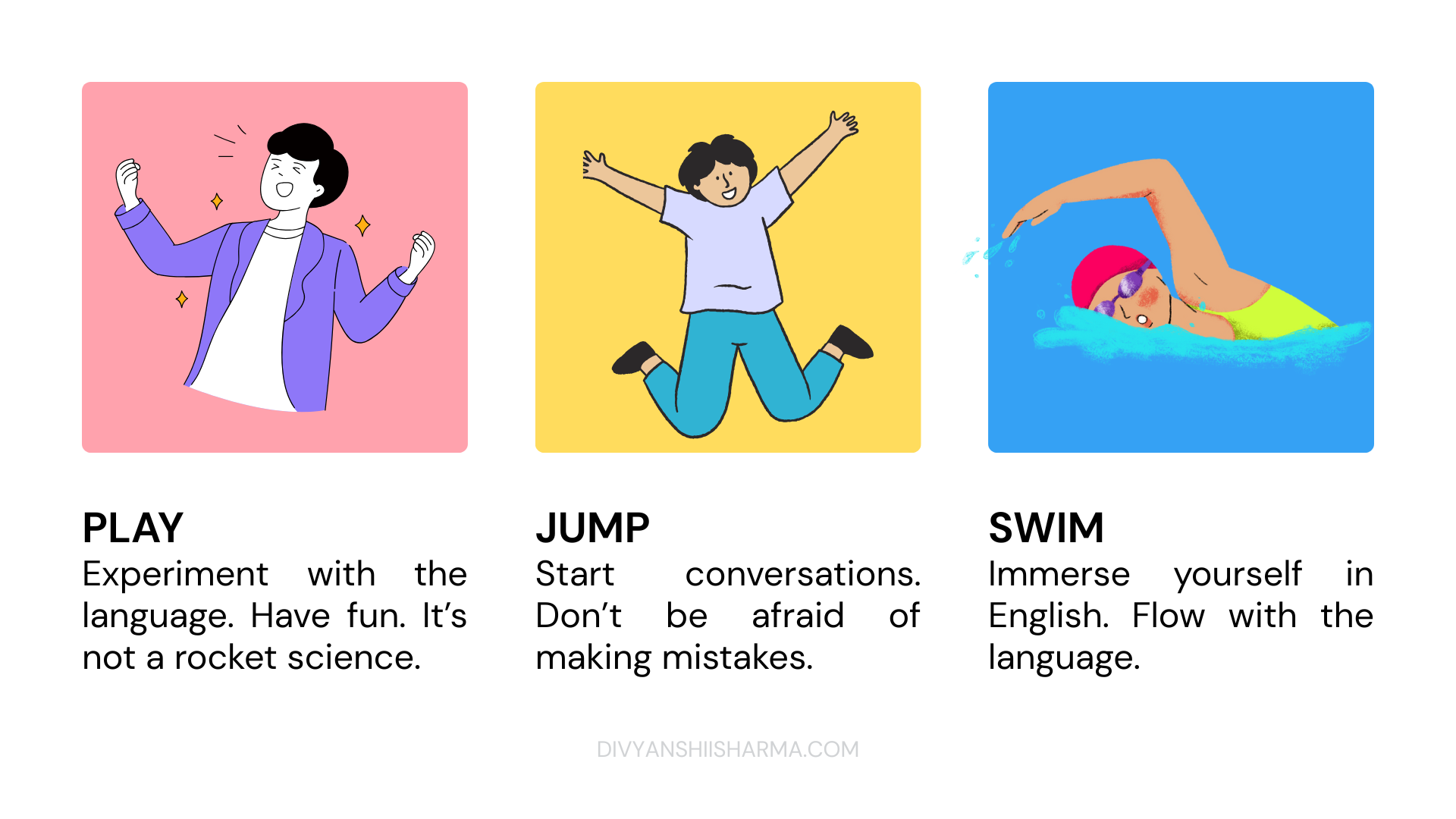“I think my English is poor. No! You are translating in your head constantly instead of thinking in English.”
Priya wished to proceed with her career in the archaeologist stream at Caltech University. She had even passed her written exam for a scholarship, but the challenge was her first interview. She was quite good at writing, however, she had never been a fluent speaker. She came to us with a question: “How can I train my brain to think in English?”
So, if you are also stuck translating Hindi to English before speaking, you must read this. Thinking in English is the foremost step to become fluent in English. You also know learning a language doesn’t happen overnight. It takes a lot of hard work, consistency and patience. People dump a lot of money and time with little success. Do you know the reason? Because they get so obsessed with memorizing grammar rules, learning vocabulary and never even start thinking in English. So, here you will get to know how to actually think in English. Let’s begin.
21st century methods to Think in English
Do you remember Priya? We have asked her to try these methods. At present, she is working in her dream company, leading a team of 9 people. So, first, let’s understand what is stopping people like you and Priya from thinking in English. We sat in a team and we had an elaborate discussion on it and came to the conclusion that there are only two major obstacles: Wrong mindset and wrong strategies.
Yes! Nothing else. If your brain is not able to think in English, then you have to work on these two aspects, and you will be good to go. But here is a disclaimer: This won’t work with outdated learning methods. So, what are those new-age methods to think in English? Let’s understand…
Language Immersion Theory to think in English

Immersion is exactly like swimming in the river. So, when you jump into the river and you struggle with its current, then it gets difficult, but the moment you start flowing with the flow of the river, you start becoming comfortable with the water. You have to do the same with your English learning. Start with reading books that will help you see how sentences & phrases are used and will help you in learning new words. Listening to music while singing along will help you remember them better.
It is a good way to practice by familiarizing yourself with the words. Watch TV shows or movies in English. You can start with subtitles that will help you connect with the speech. This will help you make sentences in English. You will become more fluent while speaking English, and you will be able to think in English. Neither resist nor force yourself. Do what you enjoy and go with the flow. Just make sure that you do it every day for at least 15 minutes.
Create an English-rich Environment to think in English
Change your phone and application settings to English. With this daily exposure to English, your mind will adapt easily to the language. Label every item in your workplace in English. Every time you see a label, it will strengthen your memory. For example, labeling them with their fancy names instead of their names, like closets instead of cupboards, Trash cans instead of dustbins, etc. Now, this will slowly make your mind more flexible to think in English and to respond immediately when it comes to speaking in English instead of translating words and phrases in your head.
Describe things around you
Try and keep talking to yourself in English as often as you can throughout the entire day. Express what you are doing at a given time, for example, ‘I am preparing breakfast’ or how you are feeling at a given time, ‘I am feeling happy today’. It also helps vocabulary and makes it easy for you to develop sentence structures, hence effectively training your mind to think in English. Pick a topic and try to explain it for 3 to 5 minutes alone, then try to communicate with your friend or family on the same topic.
And slowly increase the time. Don’t care about grammar at first, just speak. Confidence in speaking is more important than correcting grammar. There is a particular practice that Priya did in her preparation. So, she started observing different objects around her, and she used to describe these objects in 5-6 lines. This helped her to think in English more efficiently.
Expand Your Vocabulary
We have noticed students learning new English words every day, but when it comes to using these words in their conversations, they get stuck. The reason is simple. They are learning individual words instead of a complete phrase. So, no matter how many words you learn, you will never be able to use them in sentences. The best way to learn vocabulary is to learn complete phrases and sentences. This helps you to think in English.
Also, reading helps a lot in learning new words, marking the words you find interesting, and using them next time in your conversation. Learn at least one new word or phrase every day, then write it down and use it in your conversations as soon as you can!
Are social interactions scary?
Sometimes you have everything in your head all lined up, but when it comes to actually interacting with somebody, you get stuck. Why? Fear of making mistakes. You cannot afford to use wrong grammar while speaking to your colleagues. They will judge you. So, the best way is to find a safe, non-judgmental space for yourself. A language practice group, online or offline, or live training sessions, where there is a mentor to guide you throughout your learning journey. Here, nobody is going to judge you, and that will help you practice more.
Regular Speaking is the most efficient way to train your brain to think in English. Also, set specific topics for discussions, as it is a good way to challenge your vocabulary. It should not be that one person speaking and others listening sort of online classes. But you should get daily chances to participate in speaking so that you can learn how to think instantly in English.
Write your thoughts
Now, so many students when they join our mentorship programme, they question that while we are here to speak in English, why are you sometimes making us write? Fair enough! Let us answer this question once and for all. Writing in English helps you build thoughts in the language. When you write, you get enough time to think, and when you think, you come up with a lot of new ideas. Start writing in your diary. Journaling is the best way to articulate your thoughts. Then, after some time, you may start writing on LinkedIn or Twitter.
Share your opinion. It gets you into the habit of thinking in English, especially if you are finding thinking itself to be difficult at first. Also, as our brain tends to forget things that we find uninteresting so if you write your learnings on your own, your brain will be able to retain it for a longer time.
Take your daily dose of English
Practicing English daily is the best way to learn the language, and there are many fun ways to incorporate the language into your daily practice. Use apps and online platforms for just five to ten minutes to get quick lessons or watch a small portion of a podcast. Also, several online games will help you provide small online tests to measure your progress. This is your fight to speak confidently, so you have to become a warrior to win it.
For example, you cannot expect to learn dance without practicing it; in the same way, you cannot learn to speak confidently in English without practicing and participating. So, without procrastination, take this call and start learning English every day.
Set goals
It is a part of Metacognitive Strategies, which involve being aware of your learning process. Setting goals for practicing English should be as specific as possible, but also achievable, like ‘I will think in English for 10 minutes a day’, or ‘I will speak on any particular topic for at least 15 minutes a day’. Document all your achievements and change your goals around to match your new progress to make the goals interesting and fulfilling. This will help you to think in English and to become a confident English speaker. Setting goals will help you to stay accountable and achieve a higher level of efficiency.
Here is what you have to do next…
Get in the habit of naming things in English in your head. Wherever you are, look around for objects, places, and other things and try to think what they are called in English (and look them up if you don’t know). Force your brain to associate images with vocabulary. Also, try having conversations in your head in English, counting things in English, describing your actions in English, writing in English (like a journal), writing your grocery list in English, etc.
Consume as much English as you can. Books, movies, games, podcasts, etc. Make English a part of your life instead of just something you set aside to study. That way, your brain will begin to receive information in English instead of just your native tongue. Now, what do you think, after doing all this, is there anything on earth that could stop you to think in English? Not at all.
How to Think in English? FAQs Answered
How to build my English brain?
Follow these steps and you’ll be able to build your brain in English and of course, you will be able to think in English.
1. Learn vocabulary in phrases, not single words.
2. Try to talk to yourself in English.
3. Role-play situations and conversations with yourself.
4. Record yourself speaking in English.
5. Surround yourself with English by listening attentively to any podcast or English movie, and make yourself write, listen, read, and speak in English.
6. Practice as much as you can, and be consistent in following these steps.
7. Set targets like every day to speak for 10-15 minutes and every week taking a quiz to test your progress.
How can I think better in English?
Whenever you’re alone, tell yourself to think in English for the next 5-10 minutes. Slowly increase. Then make longer commitments. For example, in the weekends when you don’t have to work and think on your feet, make yourself think only in English for the next 12, 24 or 48 hours. For those days, it would be better if you listen and watch things in English as well.
Why you are not able to think in English?
There could be several factors responsible for it:
• Limited vocabulary knowledge
• Being comfortable in the native language
• Lack of confidence
• Social anxiety issue
• Lack of practice






